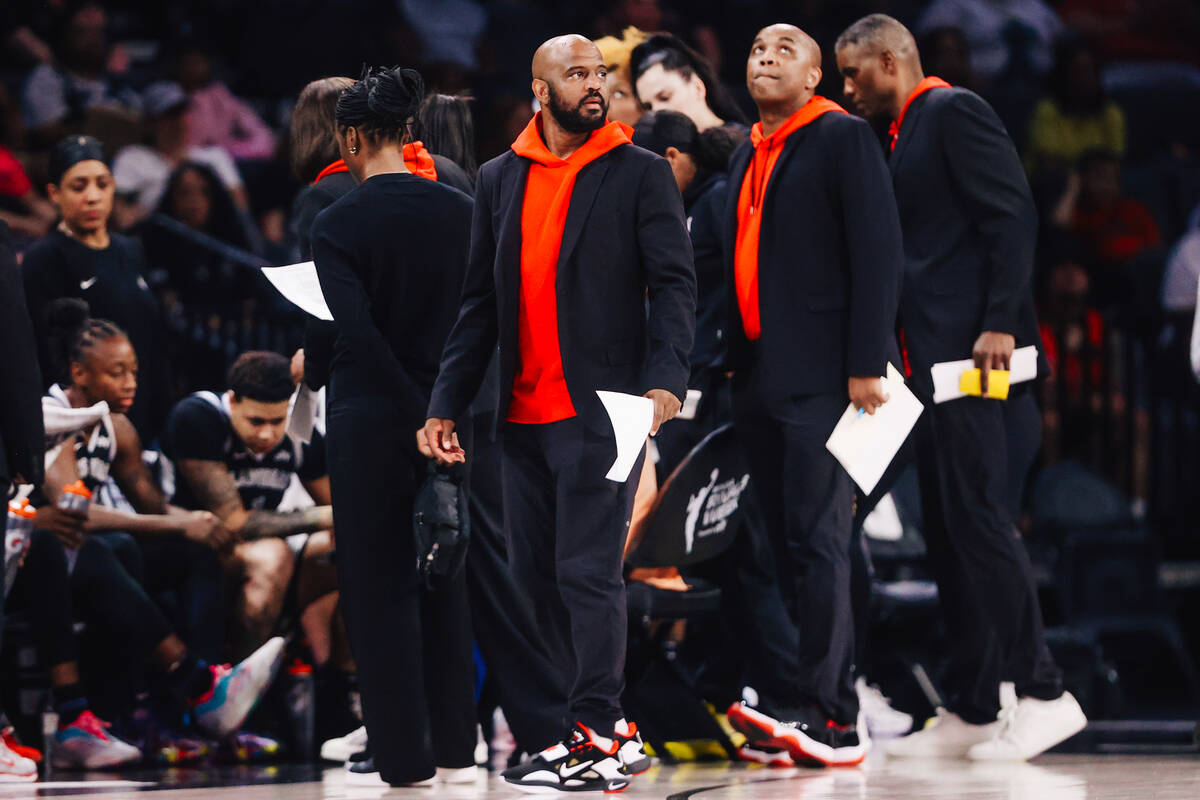New assistant ‘hugely important’ to Aces’ success in coach’s challenges

Sometimes it’s Jackie Young and Kierstan Bell frantically spinning their index fingers like tornadoes while running toward the Aces’ bench, as they did on the road against the Golden State Valkyries on Wednesday.
In other cases, it can be as simple as Chelsea Gray putting her hands on her knees with her mouth agape in reaction to an official’s whistle — seen as recently as in the third quarter of Friday night’s win over the Seattle Storm.
Whatever it looks like, the signal means there’s a high probability the Aces are about to make the referees review a play and have a call successfully overturned in their favor.
It’s one of few metrics in which the Aces (17-14) are tough to beat this season: They’re 18-3 in coaching challenges, including 6-0 since last month’s All-Star break.
Next best at catching referee errors is the Minnesota Lynx, with a 15-4 record on challenges. The Lynx are also 6-0 with challenges since the All-Star break, the obvious difference with the Aces being that their 26-5 win-loss record is the best in the league.
But as the Aces build momentum by winning five of their last six games and moving up to tie for fifth in the league’s standings, coach Becky Hammon has often emphasized the importance of those in-game split decisions to challenge calls — and John Lucas III, the assistant behind them.
“To have eyes on (the officiating) that you really trust and are reliable is hugely important,” Hammon said. “You’re talking about doing something in a game that could take points off the board for them, add points to your board, or get you a possession. So those things are really crucial.”
Hammon hired Lucas, a former NBA player and assistant, as her player development specialist in January to complete her replenished staff.
“He’s been really critical in some games with the challenges. He’s just got a really good eye for it, a talent,” Hammon said of Lucas.
Art of the challenge
In a rule change instituted by the WNBA last season, coaches have the ability to initiate one instant replay review per game. If the challenge is successful, the team is granted just one more challenge for the rest of the way, including overtime.
To use a challenge, teams must have a timeout available and clearly signal intent to challenge. They can only be used to review out-of-bounds calls, goaltending/basket interference or fouls called on the coach’s own team.
Hammon said Lucas is “basically in charge” of deciding when to use a challenge, but he credited the rest of the staff.
“Obviously, I get the last say,” he said. “Becky gives all her assistants a voice, which is what I love. It’s different than a lot of places I have been. Here, everybody has a voice in every game, and everybody has a different lens.”
Because of his role as a player development coach, Lucas spends a lot of “one-on-one time” working with each player, Hammon said. That works in his favor from the bench.
“I go back and look at the plays, and then also trust the young ladies that are on the court,” Lucas said. “If (Gray), A’ja (Wilson) and (Young) are adamant about something, saying ‘I did not touch the ball or I did not foul her,’ I usually go with their gut feeling. Then, I look at it and confirm again before I put it in the referee’s hands so they can see.”
Hammon and the rest of the league’s coaches have been especially vocal about the officiating this season, with the Aces coach’s critiques reaching a peak as she lambasted the referees in a loss to the Washington Mystics on July 10 as “awful.” She successfully challenged two calls that night, but said she could’ve challenged “seven more.”
Since then, she’s talked about the consistency of calls not being on par with the NBA. Lucas doesn’t necessarily agree.
“There’s so much going on in a possession that they’re not going to see everything, you know?” he said. “So we’ve just got to play through it and know that a lot of referees have tendencies.”
This is where the lessons Lucas learned during his time as a player are key. He said he developed a photographic memory and never forgets an official’s face.
“Once you get to have a referee multiple times, you get to understand what they’re gonna let you get away with and what’s not gonna fly,” he said. “It’s the same thing that happens in the NBA, just taking everything with a grain of salt and adjusting your game and your playability to what best fits.”
Contact Callie Fin at cfin@reviewjournal.com. Follow @CallieJLaw on X.